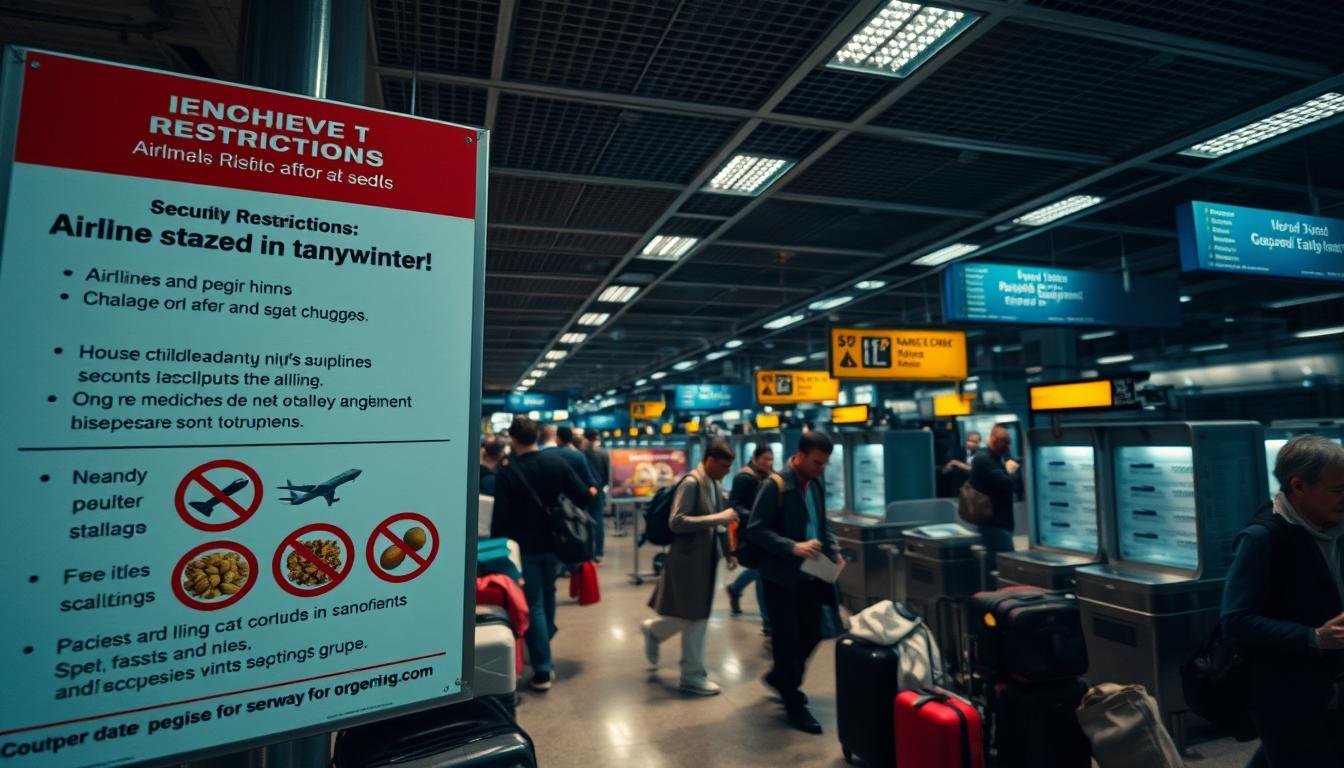As you get ready for your next flight, it’s key to know the airline travel restrictions on certain foods. This includes seeds banned on planes and nuts prohibited on flights. Knowing these rules can make your trip smoother.
When you pack for your trip, knowing which seeds and nuts are banned can prevent airport problems. These rules are in place for safety and security reasons.
By knowing what’s okay and what’s not, you can travel without stress. This article will explain these rules and offer tips on packing allowed items.
Contents
- 1 Understanding Airline Regulations for Food Items
- 2 Which Seeds and Nuts Are Banned in Airline Travel
- 3 Agricultural Restrictions and Quarantine Concerns
- 4 Reasons Behind Seed and Nut Restrictions
- 5 How to Properly Pack Permitted Seeds and Nuts
- 6 Tips for Traveling with Allowed Seeds and Nuts
- 7 Traveling with Seeds and Nuts: Final Considerations
- 8 FAQ
- 8.1 What seeds and nuts are prohibited on international flights?
- 8.2 Why are certain seeds and nuts restricted on planes?
- 8.3 How do I properly pack permitted seeds and nuts for air travel?
- 8.4 What are the consequences of not declaring seeds and nuts at airport security?
- 8.5 Can I bring seeds and nuts in my carry-on luggage?
- 8.6 How can I check if a specific type of seed or nut is allowed on a plane?
- 8.7 Are there any specific regulations for traveling with seeds and nuts to certain countries?
- 8.8 What should I do if my seeds and nuts are confiscated at airport security?
Understanding Airline Regulations for Food Items
Traveling by air means knowing the rules about food items. Each country has its own rules to stop pests and diseases. These rules help protect local farms.
To avoid trouble, learn about these rules. Check with your airline or local authorities for food item guidelines.
| Food Item | Allowed | Restricted |
|---|---|---|
| Seeds | No | Yes, in some countries |
| Nuts | Yes, in some cases | Yes, if not properly packaged |
| Dried Fruits | Yes | No, if properly packaged |
Knowing these rules helps you pack right and avoid problems. Always check with your airline for the latest on travel restrictions on food.
Which Seeds and Nuts Are Banned in Airline Travel
Airline travel has rules about carrying seeds and nuts. These rules help stop pests and diseases from spreading. It’s key to know which seeds and nuts are banned or restricted on flights to avoid problems.
Some seeds, especially those for planting, face agricultural restrictions. These rules aim to stop harmful pests or diseases from entering new areas. Untreated or badly packaged seeds can carry insects or pathogens that harm local crops or ecosystems.
Nuts are also subject to flight restrictions. While many nuts are okay, some might face quarantine or agricultural rules. For example, nuts that aren’t properly processed or packaged might be restricted due to contamination or pest risks.
To follow airline rules, check with your airline or authorities before flying with seeds or nuts. You can find this info on the airline’s website or by calling their customer service.
Some specific examples of restricted items include:
- Seeds for planting that are not properly treated or packaged
- Nuts that are not commercially packaged or are from certain regions with known pest or disease issues
- Food products made from seeds or nuts that are not compliant with agricultural regulations
Knowing these restrictions helps you pack right and avoid travel issues. Always check the latest rules before your flight for a smooth trip.
Agricultural Restrictions and Quarantine Concerns
Air travel rules for seeds and nuts are strict. This is to protect local ecosystems. When you travel with these items, you must follow the rules of the countries you visit.
Inspection Procedures
Inspections are done to check for prohibited items. You might need to open your luggage or cargo. Inspectors check if the items meet local rules.
To travel smoothly, know what you need to declare. Not declaring items can lead to fines. You must tell about the seeds or nuts you carry and be ready for inspection.
| Item | Declaration Required | Inspection Possible |
|---|---|---|
| Seeds | Yes | Yes |
| Nuts | Yes | Yes |
| Dried Fruits | Sometimes | Yes |
Knowing these rules helps when traveling with seeds and nuts. Always check with authorities or your airline for the latest before your trip.
Reasons Behind Seed and Nut Restrictions
Travelers often wonder why some seeds and nuts are banned on flights. These restrictions aim to protect local agriculture and prevent pests and diseases. By following these rules, you help preserve the environment and ecosystems of places you visit.
Following these rules is more than just following orders. It’s about protecting native species and stopping the spread of harmful organisms. When you travel, you might carry seeds or nuts that could harm the local ecosystem. By being careful, you help protect biodiversity and agricultural health worldwide.
Rules about seeds and nuts vary by country and region. This depends on their agricultural concerns and environmental conditions. For example, some places have strict laws to keep pests away from their crops. Knowing and following these rules makes your travel smoother and supports conservation efforts at your destination.
How to Properly Pack Permitted Seeds and Nuts
To make sure your seeds and nuts arrive safely, pack them right for your flight. When you’re traveling with food, using the right packaging is key. It helps prevent spills or leaks.
Use sealed containers or bags for your seeds and nuts. This keeps them fresh and avoids any problems during travel.
Also, check with your airline about packing food. Some airlines have special rules for food items, including seeds and nuts.
Properly packing your snacks ensures a smooth trip. So, take the time to pack them well. You’ll enjoy them at your destination without any trouble.
Tips for Traveling with Allowed Seeds and Nuts
Traveling with allowed seeds and nuts can make your trip better. It’s important to know how to pack them right. This way, your flight will be less stressful and more fun.
First, check the rules of your destination country. Each country has its own rules about food, including seeds and nuts. Make sure what you’re bringing is okay in your destination country. This will help you avoid problems when you arrive.

Here are some useful tips for flying with your favorite seeds and nuts:
- Pack your seeds and nuts in sealed containers or bags. This stops spills and keeps things clean.
- Let airport staff know if you have a lot of food. This is especially true for big amounts.
- Have your food ready for checks. Keep it easy to find and have any needed papers ready.
- Check with your airline about their rules for food on flights. They might have special rules.
By following these tips, you can enjoy your seeds and nuts on the flight. Being ready and informed is the secret to a smooth trip with your food.
Traveling with Seeds and Nuts: Final Considerations
Knowing which seeds and nuts are banned in air travel is key for a smooth trip. Always check with your airline or the relevant authorities before you go. They can tell you about the rules for bringing food items, like seeds and nuts, on planes.
To stay safe, pack your allowed seeds and nuts correctly. Also, declare them when you need to. Knowing the airline’s rules helps you enjoy your trip. It also protects local farms and nature.
By following these tips, you can have a worry-free trip with your favorite snacks.
FAQ
What seeds and nuts are prohibited on international flights?
Some seeds and nuts are banned on international flights. This is due to agricultural restrictions and quarantine concerns. Always check with your airline or relevant authorities to find out which ones are banned.
Why are certain seeds and nuts restricted on planes?
Restrictions on seeds and nuts help protect local agriculture. They prevent pests and diseases from spreading. By following these rules, you help protect native species and prevent harm.
How do I properly pack permitted seeds and nuts for air travel?
To pack seeds and nuts right, use sealed containers or bags. This stops spillage or leakage. Also, check with your airline for any special guidelines on packing food items.
What are the consequences of not declaring seeds and nuts at airport security?
Not declaring seeds and nuts can lead to fines or penalties. Always declare them and be ready for inspections when traveling with them.
Can I bring seeds and nuts in my carry-on luggage?
It depends on the type of seeds and nuts and the destination country’s rules. Always check with your airline or relevant authorities to see if they’re allowed in carry-on luggage.
How can I check if a specific type of seed or nut is allowed on a plane?
Contact your airline or relevant authorities like the U.S. Department of Agriculture. They can give you specific guidelines on traveling with seeds and nuts.
Are there any specific regulations for traveling with seeds and nuts to certain countries?
Yes, each country has its own rules for seeds and nuts. Make sure you know the rules of your destination country to avoid fines or confiscation.
What should I do if my seeds and nuts are confiscated at airport security?
If your items are taken, ask the security why. Then, contact your airline or relevant authorities to see if you can get them back or dispose of them properly.

Marcellus Stark is an investigative journalist from San Francisco, USA. He writes about global bans, rules, and unusual laws. He shares clear, interesting, and well-researched stories that help readers understand surprising facts worldwide.

